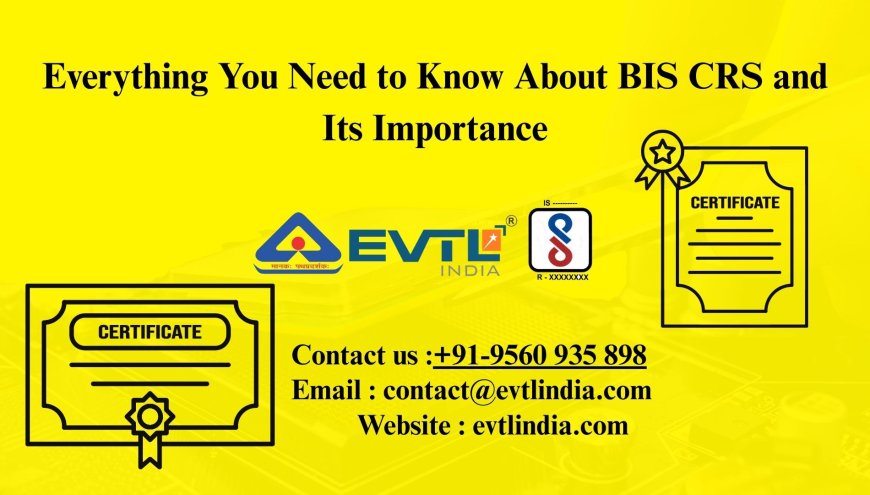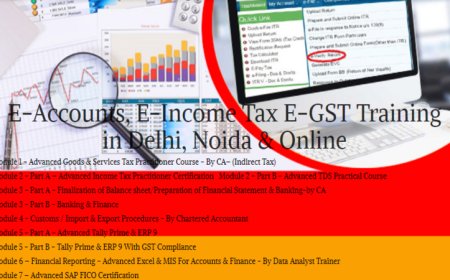Everything You Need to Know About BIS CRS and Its Importance
Top guide to BIS CRS Certification for electronic goods—understand the process, requirements, and tips for smooth BIS CRS registration.

In India, safety and quality compliance for electronic goods is a priorityespecially with the rapid expansion of imported electronics. TheBIS CRShas implemented theCompulsory Registration Scheme (CRS)to ensure that electronic products meet the required Indian standards before reaching the market. Whether you're a manufacturer, importer, or MSME looking to expand your product line, understanding theBIS CRS Certificationprocess is crucial. This guide offers complete insights intoBIS CRS Certification, BIS CRS Registration,BIS Certification for Electronic Products,BIS CRS Import from China, and the MSME Relaxation for BIS CRS, making it easier for you to navigate the compliance process with or without a BIS CRS Agent.
What is BIS CRS Certification?
BIS CRS Certificationis a compulsory registration scheme introduced by the Bureau of Indian Standards in 2012 under theElectronics and Information Technology Goods (Requirements for Compulsory Registration) Order, 2012.
Under this scheme, manufacturers (both Indian and foreign) must register their products with BIS before selling or importing them in India. The products must conform to Indian safety standards specified by BIS.
Objective of BIS CRS
-
To prevent the sale of substandard electronic goods in the Indian market.
-
To ensure consumer safety.
-
To control the influx of low-quality imports, especially from countries like China.
Electronic Products Covered Under BIS CRS Certification
More than 75 electronic and IT product categories fall under the BIS CRS mandate. Some of the common ones include:
-
Mobile phones and their chargers
-
Laptops and tablets
-
LED lights and control gears
-
UPS/Invertors
-
Televisions
-
Power adaptors
-
USB devices
-
Smart watches and CCTV equipment
For a detailed list, refer to the official website of BIS.
BIS CRS Registration Process for Electronic Products
TheBIS CRS Registrationprocess for electronic products includes multiple steps. Here's how it works:
Product Testing
The product must be tested in a BIS-recognized lab in India. The testing is done according to the applicableIndian Standard (IS). For instance, LED lamps are tested as per IS 16102.
Application Submission
After successful testing, the applicant must submit an application online through theBIS portal, along with the following documents:
-
Test reports from BIS-approved labs
-
Business license of the manufacturer
-
Trademark certificate (if applicable)
-
Authorization letter (for Indian representatives in case of foreign manufacturers)
-
Factory location and process details
: Fee Payment
Fees for BIS CRS registration include:
-
Application fee
-
Annual registration fee
-
Processing charges
-
Testing charges (paid directly to the lab)
Grant of Registration
Once the documents are verified and the application is approved, BIS issues aRegistration Numberalong with aBIS CRS certificate. The product must carry theStandard Mark (CRS logo)for sales in the Indian market.
BIS Certification for Electronic Products: Why Its Important
GettingBIS Certification for Electronic Productsis not just about complianceits a business necessity. Here's why:
-
Legal Requirement: Selling uncertified electronic products is illegal in India.
-
Consumer Trust: BIS mark ensures safety, increasing customer confidence.
-
Market Access: Without CRS certification, entry to online marketplaces like Amazon, Flipkart, and retail chains is restricted.
-
Customs Clearance: BIS CRS Certificate is required at Indian ports for imported goods.
Role of a BIS CRS Agent
For foreign manufacturers, having a reliableBIS CRS Agentin India is crucial. This agent acts as an Indian Representative and handles all regulatory communication on behalf of the manufacturer.
Key Responsibilities of a BIS CRS Agent:
-
Coordinating with BIS authorities
-
Submitting documents and applications
-
Managing product testing in India
-
Ensuring compliance with the applicable Indian Standard
-
Facilitating renewal of registration
BIS CRS Import from China
India imports a large volume of electronic goods from China. Importers must understand thatBIS CRS Import from Chinais subject to the same regulatory framework as Indian-made products.
Special Considerations for Imports:
-
Test Reports Must Be Indian: Testing of imported goods must be done in a BIS-approved lab in India. Chinese lab reports are not accepted.
-
Local Representative Required: Chinese manufacturers must appoint an Indian agent or Authorized Indian Representative (AIR) to apply for BIS CRS.
-
Customs Verification: Without BIS CRS certification, shipments will be held or rejected at customs.
MSMERelaxation for BIS CRS
Micro, Small, and Medium Enterprises (MSMEs) often face financial and procedural challenges in securing certifications. To promote ease of doing business, the Indian government has introducedMSME Relaxation for BIS CRSthrough various initiatives:
Key Benefits:
-
Subsidized Testing Costs: MSMEs may receive rebates or subsidies for product testing.
-
Simplified Documentation: Reduced paperwork for registered MSMEs.
-
Faster Processing: Priority processing may be granted to MSMEs under certain government schemes.
-
Support from MSME Ministries: Technical and financial guidance provided through MSME Development Institutes.
To avail these benefits, manufacturers must be registered under theUdyam Registration Portalas an MSME.
Validity and Renewal of BIS CRS Certification
-
Validity: BIS CRS Certification is valid for2 yearsfrom the date of issuance.
-
Renewal: It can be renewed for a period of up to 5 years, provided the product and manufacturing process remain unchanged.
Timely renewal ensures uninterrupted sales and avoids penalties or cancellation of registration.
Common Challenges in BIS CRS Registration
-
Delay in Testing: BIS-recognized labs may take weeks to issue test reports.
-
Incorrect Documentation: Minor errors in documentation can lead to rejection.
-
Complex Technical Requirements: Products must fully comply with the prescribed Indian Standard, which may differ from international norms.
-
Dependence on Indian Agents: Foreign manufacturers are entirely reliant on the performance of their Indian representative.
How to hoose the Right BIS CRS Agent
If you're a foreign company or MSME looking to register, choosing the rightBIS CRS Agentis crucial.
Tips for Selecting the Right Agent:
-
Verify experience and number of successful certifications.
-
Check for transparency in pricing and timelines.
-
Ensure proper communication and documentation handling.
-
Read client reviews or request case studies of past work.
A reliable agentcan significantly reduce time and costs while ensuring smooth compliance.
Conclusion
In a market that values quality and compliance, securingBIS CRS Consultantis a non-negotiable step for electronics manufacturers and importers targeting India. FromBIS CRS Registrationand hiring a qualifiedBIS CRS Agent, to handlingBIS CRS Import from Chinaand leveragingMSME Relaxation for BIS CRS, this guide aims to cover every critical aspect to help you succeed. By staying informed and proactive in your certification journey, you not only meet legal requirements but also gain a competitive advantage in one of the worlds largest and fastest-growing electronics markets.






































